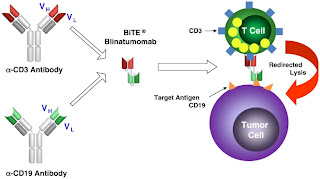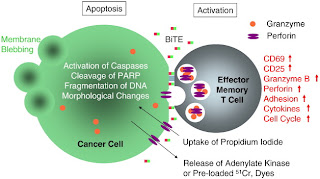 Blinatumomab is a bispecific molecule of very small size made from a single polypeptide chain comprising the variable heavy chain and light chain of an anti-CD3 monoclonal antibody joined to the variable heavy chain and light chain of an anti-CD19 monoclonal antibody. The idea is that the antibody redirects the T-cell lysis to the tumor B-cell.
Blinatumomab is a bispecific molecule of very small size made from a single polypeptide chain comprising the variable heavy chain and light chain of an anti-CD3 monoclonal antibody joined to the variable heavy chain and light chain of an anti-CD19 monoclonal antibody. The idea is that the antibody redirects the T-cell lysis to the tumor B-cell. The BiTE antibody transiently creates a cytolytic synapse between a cytotoxic T-cell and the cancer target cell; in this case a B-cell lymphoma cell. Granules containing granzymes and the pore-forming protein, perforin, fuse with the T-cell membrane and discharge their toxic content leading to the death of the target cell
The BiTE antibody transiently creates a cytolytic synapse between a cytotoxic T-cell and the cancer target cell; in this case a B-cell lymphoma cell. Granules containing granzymes and the pore-forming protein, perforin, fuse with the T-cell membrane and discharge their toxic content leading to the death of the target cellBlinatumomab has a very short serum half-life of only 2-3 hours and therefore must be administered by continuous infusion over 4-8 weeks using portable minipumps.
3 comments:
I read somewhere a while back that this should work especially well on marrow because the small rod shape could get into it better than the larger Y shaped antibodies.
Given the that this is not a tumor cell specific therapeutic, do you have any opinion on effectiveness vs risk that we can expect as this comes into use?
WWW
The specificty comes from the choice of the target antigen. CD19 is fairly specific to B cells and apart from the encephalopathy risk side effects seems to be caused by the relase of cytokines in those with circulating tumor cells.
Post a Comment